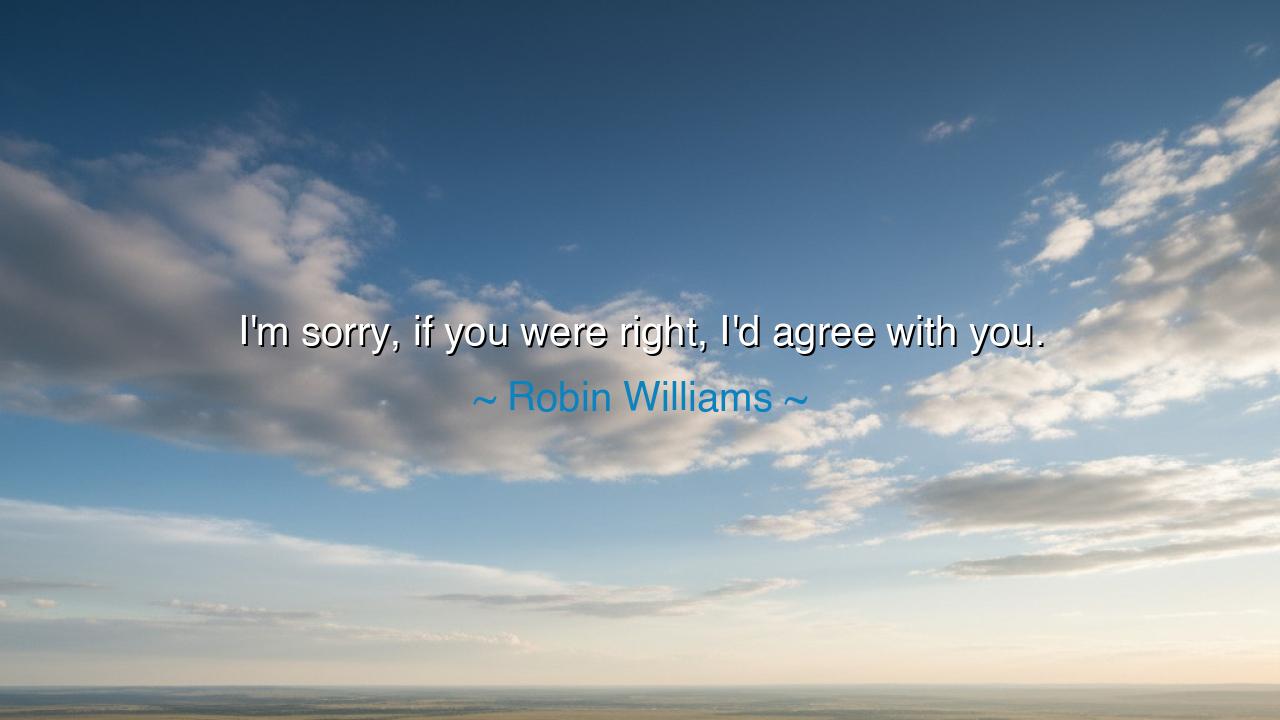
I'm sorry, if you were right, I'd agree with you.






O Seekers of wisdom, gather close and listen to the words of the great jester of our time, Robin Williams, who spoke thus: “I’m sorry, if you were right, I’d agree with you.” At first, these words may strike you as playful, even absurd in their humor, but beneath their jest lies a deeper, more profound message. In this simple declaration, Williams offers a glimpse into the nature of human conversation, the clash of egos, and the sharp dance of ideas. What is truth, and who determines it? What does it mean to be right, and to what lengths are we willing to go to defend that belief, no matter how misguided it may be?
At the heart of Williams' words lies a truth as old as time itself: We are creatures of belief, and we often find ourselves in deep conflict, not because of the facts before us, but because of the pride in our own perception. In ancient times, the philosophers of Greece gathered to debate not just for knowledge, but for the glory of their own reasoning. Socrates—great in his wisdom—spoke often of how the greatest form of learning was to recognize one’s ignorance. He did not seek to prove others wrong, but to unearth truths, and to confront the arrogance that cloaks the pursuit of knowledge. Williams' words remind us that the human mind, when it clings tightly to its own beliefs, becomes a fortress, and the more it is challenged, the harder it is to open the gates.
Consider the power of conversation, O Seekers. When two souls meet, it is not merely to exchange facts. It is to test each other’s foundations, to challenge the structures we have built around ourselves. But the great folly of such a pursuit is in believing that to win is to overpower, to diminish the other. The truth, as Williams so cleverly points out, is that when we believe ourselves to be right, we no longer seek truth—we seek victory. And in the clamor of victory, we often lose sight of the shared goal of true understanding. How many times have we seen the walls of discourse crumble beneath the weight of pride, both in the courts of history and in the rooms of our own lives?
Let us reflect upon the wisdom of the ancients—the great debates of the Roman Senate, where men of vast knowledge often clashed with words sharper than blades. In their pride, they spoke not to discover wisdom, but to elevate their own standing. The greatest among them, men like Cicero, knew that the art of true debate was not to belittle the opposition, but to raise the intellect of all parties. Yet, even Cicero’s wisdom was often obscured by those who would not yield, even when faced with truth. What is the point of being right, O Seekers, if the truth only causes division and strife?
Williams' words offer us a mirror, reflecting the nature of human pride and ego. It is the pride of being “right” that blinds us to the beauty of true dialogue. When we are locked in the conviction that our own understanding is the ultimate truth, we shut the door to growth. For wisdom does not rest in the certainty of being right, but in the humility to acknowledge that we may be wrong. How often does a fleeting moment of humility—an admission of uncertainty—open the path to greater insight? It is in this humility that we find the space for growth and understanding, not in the need to prove others wrong.
The lesson of Robin Williams’ words calls us to approach the world with a sense of openness. Rather than grasping tightly to the illusion of being right, we must learn to release our hold on ego, to embrace the notion that being wrong is not a failure, but an opportunity. To agree with another’s perspective does not diminish our own worth—it expands it. When we engage with others not to win, but to grow, we open our hearts and minds to a world of possibility. To listen is to honor another’s truth, and in doing so, we enrich our own.
And so, O Seekers, the next time you find yourself in the heat of debate, remember Robin Williams’ words. Do not seek to be right; seek instead to understand. Be humble in your approach, and allow the doors of your mind to swing wide, for wisdom comes not from the certainty of being correct, but from the embrace of truth in all its forms. Let us live not by the need to triumph, but by the pursuit of knowledge and the beauty of shared understanding. In the end, the greatest victory lies not in proving our rightness, but in acknowledging the truths we have yet to discover.






AAdministratorAdministrator
Welcome, honored guests. Please leave a comment, we will respond soon